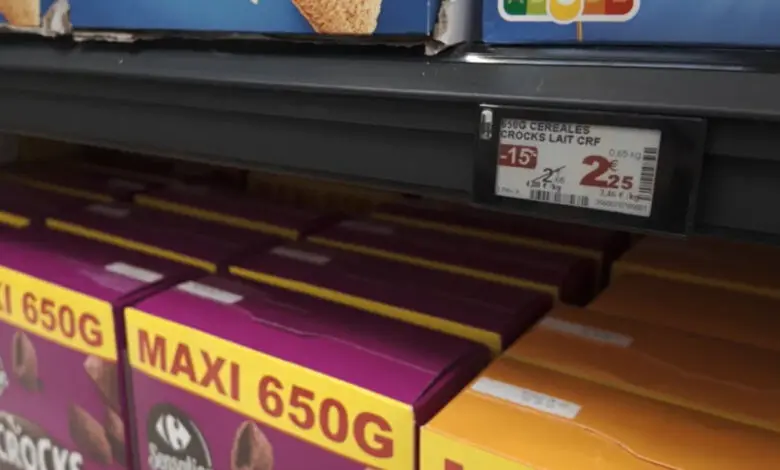Carrefour, one of France’s largest supermarket chains, has rolled out smart shelf technology in a select number of stores across the country. The initiative, unveiled this week, aims to improve inventory management, reduce waste, and enhance the customer shopping experience by leveraging sensors, AI, and real-time analytics. This technology represents a major step forward in modernising grocery retail and maintaining Carrefour’s competitive edge in the French market.
The Concept of Smart Shelves
Smart shelves are equipped with weight sensors, cameras, and RFID technology to monitor product availability and consumer interaction. These systems enable:
-
Real-Time Inventory Monitoring – Automatic alerts for low-stock or out-of-stock items.
-
Dynamic Pricing Capabilities – Adjusting prices based on demand, expiry dates, and promotions.
-
Consumer Insights – Tracking which products are frequently picked up, examined, or returned.
-
Operational Efficiency – Reducing manual stock checks and minimising human error.
By integrating smart shelves with Carrefour’s digital ecosystem, the chain ensures efficient replenishment, reduces waste, and improves overall store performance.
Consumer Benefits
Smart shelves enhance the shopping experience by providing:
-
Accurate Product Availability – Minimising frustration caused by empty shelves.
-
Dynamic Promotions – Real-time discounts on products that are nearing expiry or in lower demand.
-
Enhanced Convenience – Products can be tracked digitally via mobile apps, helping shoppers locate items quickly.
-
Personalised Recommendations – AI-driven suggestions based on purchasing patterns and preferences.
These features help Carrefour engage shoppers, improve satisfaction, and encourage repeat visits.
Operational Advantages
From an operational perspective, smart shelves provide multiple benefits:
-
Reduced Waste – Alerts about products nearing expiry reduce overstock and spoilage.
-
Efficiency Gains – Automated monitoring frees staff to focus on customer service and replenishment.
-
Data-Driven Insights – Real-time analytics guide stocking decisions, promotions, and product placement.
-
Integration with Supply Chain – Seamless connection between stores and warehouses ensures timely restocking.
The combination of automation and analytics allows Carrefour to maintain high service levels while optimising operational costs.
Technology and Implementation
Carrefour’s smart shelf deployment relies on a combination of hardware and software:
-
Weight and Motion Sensors – Detect product removal or replacement in real time.
-
RFID and Barcode Integration – Ensures accurate product identification and tracking.
-
AI-Powered Analytics – Predicts demand, identifies trends, and recommends pricing adjustments.
-
Mobile App Synchronisation – Shoppers can check product availability and receive alerts.
This technology infrastructure enables Carrefour to operate smarter stores with enhanced customer service and operational efficiency.
Market Context and Competitive Edge
The French grocery sector is highly competitive, with chains like Leclerc, Intermarché, and Auchan also exploring technology-driven solutions. Carrefour’s smart shelves provide differentiation by:
-
Offering real-time inventory insights to both staff and consumers
-
Reducing waste and promoting sustainability
-
Enhancing the in-store experience with personalised offers
-
Streamlining operational workflows for better efficiency
Analysts note that such technology positions Carrefour as a leader in the digitisation of grocery retail in Europe.
Challenges and Considerations
Implementing smart shelves comes with challenges:
-
Technical Reliability – Sensors and AI must operate seamlessly to avoid inaccuracies.
-
Initial Investment Costs – Hardware, software, and training require substantial upfront capital.
-
Staff Training – Employees must understand system functionality and integrate it into daily operations.
-
Consumer Education – Shoppers need guidance on using app features for stock alerts and promotions.
Carrefour is addressing these challenges through pilot programmes, staff workshops, and customer support initiatives.
Sustainability and Social Impact
Smart shelves contribute to Carrefour’s sustainability goals by:
-
Minimising food waste through proactive alerts and dynamic pricing
-
Encouraging responsible consumer behaviour
-
Reducing energy and resource waste associated with overstocking
-
Providing data for environmental reporting and accountability
This integration of technology with sustainability reflects Carrefour’s commitment to ethical retailing.
Future Prospects
Carrefour plans to expand smart shelf technology across more stores and enhance its capabilities:
-
Integration with AI-driven predictive analytics for product demand forecasting
-
Enhanced personalisation features in mobile apps
-
Automated alerts for staff to manage replenishment more efficiently
-
Expansion into new product categories including fresh and perishable items
These developments signal Carrefour’s ambition to modernise its operations and enhance the consumer shopping experience with cutting-edge technology.
Conclusion
Carrefour France’s rollout of smart shelf technology demonstrates how innovation can improve both operational efficiency and customer satisfaction. By leveraging AI, sensors, and real-time analytics, Carrefour minimises waste, optimises stock management, and delivers a modernised in-store experience. In a highly competitive market, the initiative strengthens Carrefour’s positioning as a forward-thinking, customer-focused retailer committed to sustainability and innovation.


